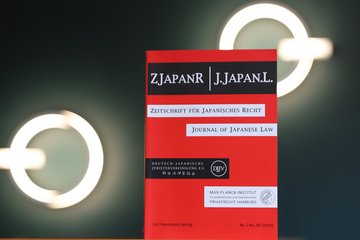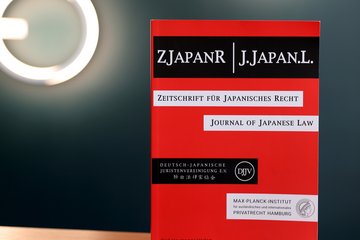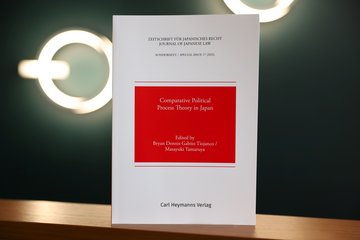
From Corporate Governance to LGBTQ+
What does research on Japanese law focus on?
Western perceptions of Japan often revolve around the country’s history of technological innovation, its strong export economy, or cultural elements holding fascination. Yet in terms of the comparative insights that Japanese law offers, little is known – even among lawyers. “There are many reasons to study Japanese law,” says Ruth Effinowicz, Head of the Institute’s Centre of Expertise on Japan. “And one’s view of Japan should not be guided solely by the – sometimes presumed – otherness of Japanese culture and society.”
From a German perspective, the two countries’ shared legal history is one of the main starting points for comparative research. When Japan, under pressure from European countries and the USA, shaped itself into a Western-style state over the course of a few decades, from the middle of the 19th century forward, it was the legal system of the German Empire – itself just emerging – that served as a central model. Ever since the reception of German civil and procedural law at the end of the 19th century, Japanese civil law scholarship has been markedly characterized by German influences.
Common themes
After the USA, China, and Germany, Japan now possesses the fourth largest economy in the world and is one of the few stable democracies in Asia. “Modern Japanese law can be described as a mixed legal system due to the influences from different legal systems,” explains Effinowicz. “Japan has become a part of the Global North, and the German-Japanese legal dialogue is primarily concerned with the common challenges faced by modern, highly industrialized societies. These include climate protection and corporate governance as well as demographic change, healthcare, and policy issues in respect of security.”
For example, after the outbreak of the pandemic in 2020, the Centre of Expertise took the initiative to hold a virtual conference at which legal scholars from Germany and Japan examined the two legal systems’ reactions to the Covid-19 virus. Similarly, an event series launched in 2022 by Effinowicz in cooperation with the Deutsch-Japanische Juristenvereinigung e.V. (German-Japanese Association of Jurists, DJJV) is dedicated to addressing joint questions regarding security policy against the backdrop of the Russian invasion of Ukraine.

„Academic work on Japanese law demands a
context-sensitive approach that always takes the
Japanese perspective into account.“
– Ruth Effinowicz –
As is the case in Germany, social norms and conceptions of family are being questioned also in Japan, as for example the desire of queer individuals to have their relationships legally recognized. Accordingly, Effinowicz is following the legal developments in Japan regarding same-sex marriage. Although – unlike in Germany – there is no legal basis for same-sex marriage in Japan, it has been the subject of multiple court rulings in recent years. “The Japanese Constitution, which like the Basic Law announces a principle of equal treatment, could certainly provide a framework for a possible change in the law.” The parallel German developments and debates are, correspondingly, followed with interest in Japan.
Role in the Asian context
But Germany is not the only country focused on Japan. A number of Asian countries have been inspired by modern Japanese regulatory models. Even though Japan's role as an exporter of legal concepts may be at odds with the still prevalent and hierarchically defined depiction of the country as a mere recipient of Western legal concepts, Japan has in fact been an exporter of law for well over a century. This influence began at the point when the country became a regional colonial power. And since the 1990s, promoting legal transfer has even been a part of Japan's official foreign policy. “In specific terms, this may involve technical legal assistance, legal harmonization projects, and the provision of legal education,” says Effinowicz, who was the lead organizer of an international symposium addressing the topic in 2022.
A nuanced approach to research
“Academic work on Japanese law demands a context-sensitive approach that always takes the Japanese perspective into account,” stresses Effinowicz. “The Centre of Expertise has at its disposal a high-calibre and international network of academics and practitioners that has grown over the decades. This consortium of individuals with expertise across all areas of law allows us to examine our topics of research from a variety of perspectives.”
Overcoming the barrier of language
One of the most important tasks of the Centre of Expertise on Japan is editorial supervision of the Zeitschrift für Japanisches Recht / Journal of Japanese Law (ZJapanR / J.Japan.L.). Published twice yearly and featuring comparative analysis on a full range of Japanese law topics, the journal adopts a variety of formats and methodological approaches and maximizes accessibility to Japanese law through publication in western languages. Launched in 1996 by Harald Baum, then Head of the Centre of Expertise, the journal is published by the Institute in cooperation with the German-Japanese Association of Jurists. It is the only publication outside of Japan that regularly documents and analyses the myriad lines of development of Japanese law for an international readership in German, English and French. It has, in just under three decades of existence, succeeded in becoming a global forum promoting dialogue on Japanese law.
Header: © Adobe Stock_ake1150
Portrait Ruth Effinowicz: © Max Planck Institute for Comparative and International Private Law / Johanna Detering












